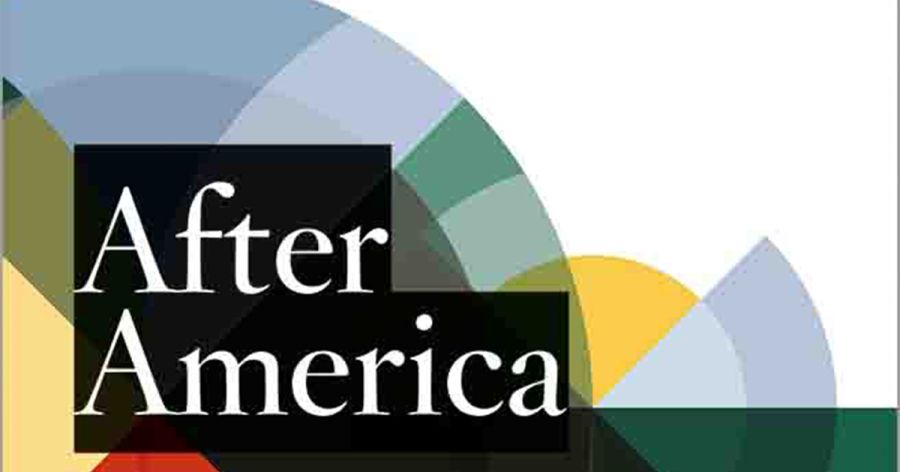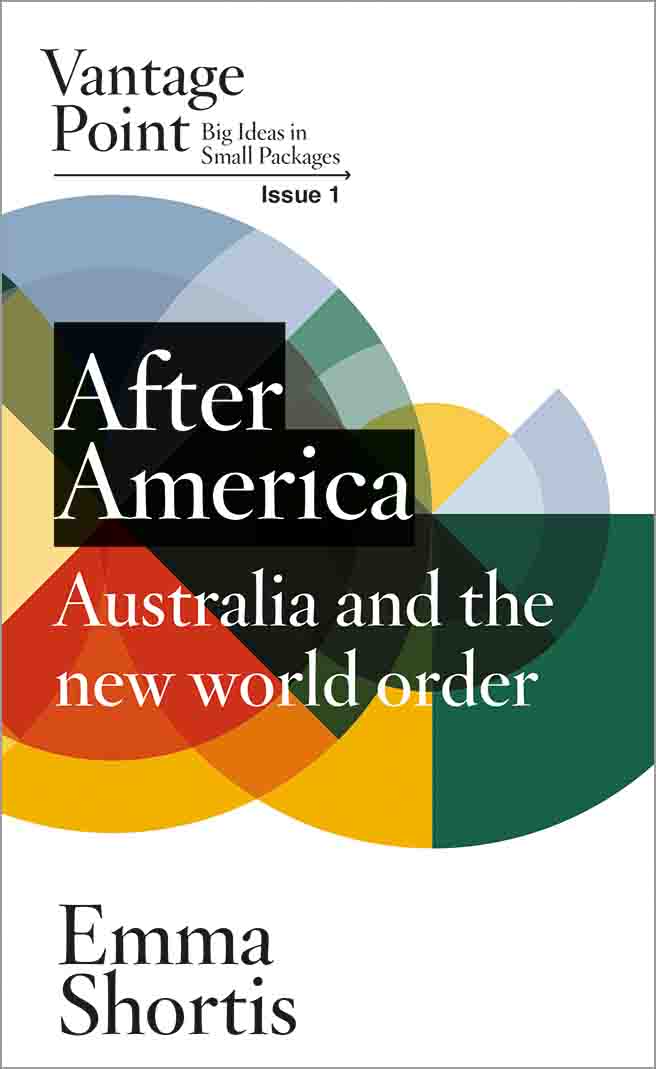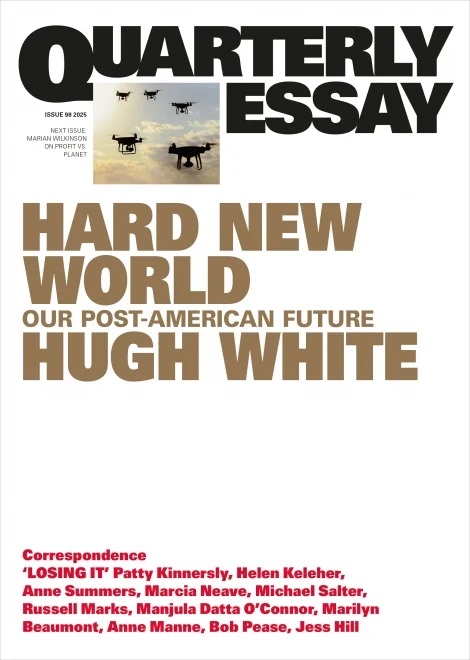
- Free Article: No
- Contents Category: United States
- Review Article: Yes
- Article Title: Dogged pursuit
- Article Subtitle: Australia’s ‘America first’ policy
- Online Only: No
- Custom Highlight Text:
It is a remarkable fact that our political leaders’ dogged pursuit of ‘national security’ through the United States alliance and the costly and controversial AUKUS agreement seems to be making Australians feel rather more insecure, indeed downright anxious, feelings exacerbated by the elevation of the mercurial Donald Trump to a second term as US president.
- Book 1 Title: After America
- Book 1 Subtitle: Australia and the new world order
- Book 1 Biblio: Australia Institute Press, $19.99 pb, 128 pp
- Book 1 Cover Small (400 x 600):

- Book 1 Cover (800 x 1200):

- Book 1 Readings Link: https://www.readings.com.au/product/9781763662131/after-america--emma-shortis--2025--9781763662131#rac:jokjjzr6ly9m
- Book 2 Title: Hard New World
- Book 2 Subtitle: Our post-American future (Quarterly Essay 98)
- Book 2 Biblio: Black Inc., $29.99 pb, 112 pp
- Book 2 Cover Small (400 x 600):

- Book 2 Cover (800 x 1200):

- Book 2 Readings Link: https://www.readings.com.au/product/9781760645007/on-war-and-peace-and-the-new-global-order--hugh-white--2025--9781760645007#rac:jokjjzr6ly9m
In a recent essay in The New York Review of Books about the election of Robert Prevost as Pope Leo XIV representing ‘an alternative model of American global leadership’, Fintan O’Toole observed that in a number of recent elections, including in Canada and Australia, being ‘the un-Trump candidate’ proved to be an ‘electoral advantage’. Anthony Albanese surely owes much of his landslide victory to Australian hostility towards, and fear of, Donald Trump. Subservience to the United States – as exemplified by Peter Dutton’s Coalition – was not a popular position. But can we expect the second Albanese Labor government to forge a new independent path in foreign policy and defence? AUKUS is Scott Morrison’s legacy, but it was uncritically embraced by the Albanese Labor in opposition, and now in government, though it is also now noticeably reluctant to talk about it.
Two new books, Emma Shortis’s After America: Australia and the new world order and Hugh White’s Quarterly Essay, titled Hard New World: Our post-American future, argue that it is time to imagine a post-American world in which Australia moves beyond the shackles of the Australian-American alliance enshrined in the ANZUS treaty of 1951 and the AUKUS security pact of 2021. Both authors make powerful arguments for the urgency of bold independent thinking, for bravery, understanding, and imagination in conceptualising a new path forward in the world. Both authors validate Australian anxiety about our ties to the United States and make the case that the alliance is dangerous for our country, jeopardising our sovereignty and security and likely leading us into another American war. For during the past two decades, as White points out, Australia has developed ‘an “America First” foreign policy too’.
It’s not just the advent of Donald Trump that is the issue for Shortis and White. Their call for a post-American future arises from recognition of the significant historical changes that have occurred in our region, in the United States, and in the wider world over the past several decades. We now live in a multi-polar world fraught with new tensions and reawakened nuclear rivalry. The authors agree that the necessity for Australia to forge independent foreign and defence policies was clear before Trump became president for a second time, but that his volatility, vindictiveness, and increasingly authoritarian character have made the necessity for a break ever more urgent. In dealing with Trump, we should not, Shortis warns, engage in ‘pre-emptive capitulation’.
The two authors bring distinctive intellectual and disciplinary training to understanding Australia’s place in the world. Emeritus Professor of Strategic Studies Hugh White is a defence strategist at the Australian National University and the principal author of the Australian government’s 2000 Defence White Paper. His books include The China Choice (2013) and How to Defend Australia (2019). The new Quarterly Essay addresses the implications for Australia of ‘the rise of China’. ‘China’s rise,’ he writes, ‘feels like an old and familiar story, but we in the West still do not understand its full significance.’ Since the turn of the century there has been ‘a truly fundamental shift in the global distribution of wealth and power’ embodied in the economic ascendancy of the ‘two most populous states, India and China’. Today, ‘China’s economy is 30 per cent bigger than America’s’, writes White.
White’s argument here recalls the writing of an earlier Australian commentator on ‘changing world forces’ at the end of the nineteenth century. In National Life and Character: A forecast (1893), Charles Pearson, noting that China’s population had already surpassed 400 million, wrote with prescience that with ‘civilisation equally diffused … the preponderance of China over any rival – even over the United States of America – is likely to be overwhelming’. The future would see China take ‘its inevitable place as one of the great powers of the world’. Pearson’s contemporaries in England and the United States were stunned by this novel and seemingly perverse prediction, but they found an explanation in his location in Australia, in the south-west Pacific, a vantage point that afforded him a distinctive perspective on the world. White and Shortis remind us that our vantage point remains particular.
Pearson’s Australian contemporaries – Alfred Deakin, Henry Higgins, Edmund Barton et al. – took his forecast of Chinese power seriously. Their response was to erect ‘great white walls’ around the continent, to construct White Australia to keep the Asiatic threat at bay. From the 1960s, however, Australians began to look north with new interest; they began to forge new ties with China, engaging in wide-ranging cultural, educational, economic, and trade exchanges. The Colombo Plan brought Chinese and other Asian students to Australia. Asian histories and languages began to be taught in universities. Future diplomats were trained in Asian languages.
By the mid-1970s we had established full diplomatic relations with Beijing and during the last decades of the twentieth century, as White notes, Australian diplomatic initiatives ‘did a lot to shape the international order, solve difficult problems and serve a wide range of interests’. White lists them:
The Cairns Group and APEC, the Cambodian Peace Agreements, the Chemical Weapons Convention, the Comprehensive Nuclear Test Ban Treaty, the South Pacific Nuclear Free Zone, our promotion of the ASEAN Regional Forum, the Antarctic Mining Ban, sanctions on South Africa to end apartheid, our role in East Timor’s transition to independence, and many more.
This reminder of Australian creative, diplomatic engagement with the world makes one feel nostalgic.
It is sobering to realise just how much of our diplomatic efforts are now directed towards supporting the United States. Now we offer billions of dollars to the United States – ‘the biggest transfer of funds in Australian history’, Shortis observes – so that we might purchase nuclear-powered submarines that are explicitly designed to maintain American supremacy in a contest with China. White offers numerous reasons for why this policy devised under the Biden administration won’t work. Yet through ‘AUKUS and in countless other ways, successive Australian governments have encouraged Washington to believe that it can rely on Canberra’s total military support in a war with Beijing over Taiwan’. Furthermore, American investments in facilities to support US Air Force long-range strike missions, from Tindal in the Northern Territory, mark a significant step in preparations for Australia to support America in a future war. No wonder Australians are worried.
In outlining the elements of a fresh approach that Australia might take to defence and foreign policy, White emphasises two tasks: the necessity of retrieving our relationship with China – ‘the most important relationship in the world for Australia’ – and rethinking our relationship with America, one aspect of which is to make clear that we would not join a fight over Taiwan. In devising defence commitments and national budgets, the key step is to agree that our armed forces must be designed primarily to defend Australia independently, rather than to support America in a war with China. Once that is decided it becomes easier to decide what capabilities we need. In White’s view they do not include nuclear-powered submarines.
One effect of Australia adopting an American view of the world has been the revival of the China threat narrative in Australia. As the United States seeks to maintain primacy in East Asia, Australians have been encouraged once again to see China as our enemy. Whereas the White Australia policy aimed to keep Chinese at bay, now we are encouraged to acquire nuclear submarines to take the fight up to China itself. Australia has signed up to an ‘America First’ policy even as Australia’s history, interests, perspectives, and values diverge dramatically from those of the United States. White argues that it is time to embrace ‘our Asian destiny’.
Emma Shortis, trained in history at the University of Melbourne and Yale University, has deeply researched Australia’s relationship with the United States. Her first book, Our Exceptional Friend: Australia’s fatal alliance with the United States (2021), made the case that, on moral and political grounds, our relationship with the United States needed a serious overhaul. In her punchy follow up, the first essay in the new series, Big Ideas in Small Packages, published by the Australia Institute, she brings her argument up to date. Shortis reports on the recent American election, becoming impatient with the ‘foreign policy arrogance Kamala Harris inherited from Biden’. She denounces their ‘retaliatory genocide against the Palestinian people’ and the global climate crisis that is ‘largely driven by American capital’.
Shortis is clear in her radical vision of an alternative kind of security than that foisted on us by the defence establishment and our political leadership. Rather than send billions of dollars to the United States in a possibly futile quest to procure nuclear-powered submarines to fight in an American war with China, we might enjoy a new kind of human security: ‘We could decide, like Norway, that instead of charging our kids to go to university and subsidising fossil fuels to the tune of $14 billion, we could instead tax fossil fuels and make university free. We could invest in public education, in public health, and action on climate change. We could operate in genuine partnership with countries in our region to build collective security.’
Emma Shortis and Hugh White both call for a change of national policy and direction. They both write from a specifically Australian perspective and vantage point. They speak from Australian experience and advocate Australian values. And both take up Paul Keating’s suggestion from several years ago that Australia find its security not from Asia, but in Asia. Both interventions are essential reading now.


Comments powered by CComment